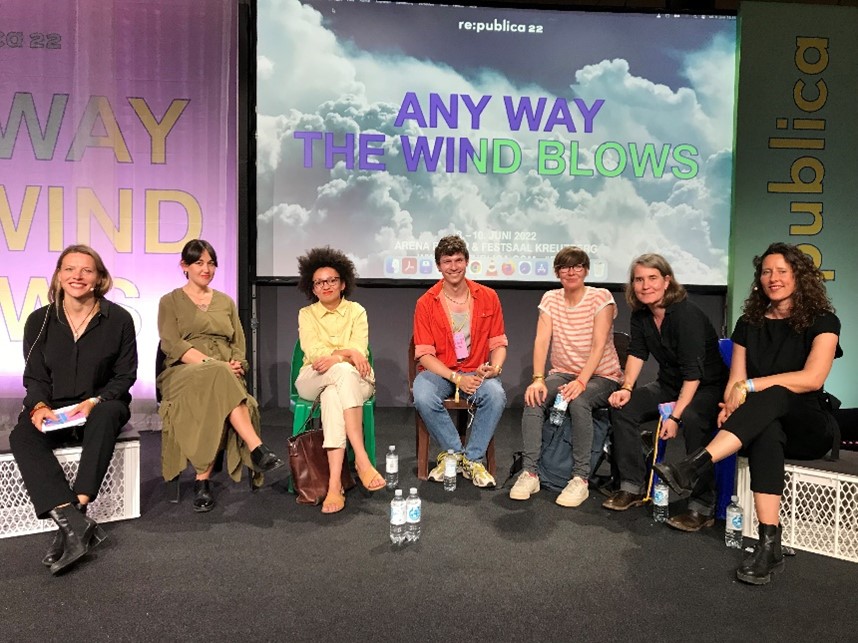Blog
Let’s Talk About Queer Media
By Julia Jaroschewski and Sonja Peteranderl
It’s Pride Month – the month when companies in Germany and around the world show their support for queer people, design their logos in rainbow colors and show how important diversity is to them. But often these are marketing strategies rather than a genuine commitment to the LGBTIQ* community. But how queer are media companies in 2022, organisations which should be doing their part to show a diverse image of society?
From queer podcasts, investigative journalism uncovering abuses and grievances to the lesbian dating show “Princess Charming”, more and more diverse issues and formats are making their way into the German media world. But high-profile mass coming outs of queer actors and actresses – #ActOut – and employees of the Catholic church (#OutinChurch) show that people who come out still experience personal and professional disadvantages. Debates in social networks and some media agitate against homosexuality and transsexuality, and queer people are experiencing increasing violence, even on the streets of liberal cities like Berlin.
We, Julia Jaroschewski and Sonja Peteranderl – journalists and founders of the think tank BuzzingCities Lab – hosted a panel of journalists from different backgrounds at the digital conference re:publica 2022 in Berlin. The panelists shared experiences, trends and challenges in print media, public broadcasters, cinema, community media and digital formats. Three learnings.
There is currently an upsurge in queer formats – but a lot is still missing
Netflix and also public broadcasters increasingly have queer content such as series in their programming – but according to studies, diverse lifestyles and stories are still underrepresented in the German media world. Queer visibility is increasing, yet it still takes time: “We have decades of catching up to do,” says director Kerstin Polte, who has worked for years to bring queer roles to the screen and also collaborated on the new series “Becoming Charlie” – the first German series with a non-binary main character.
Filmmakers have to fight against resistance and they often have to put up with poor production conditions – because so far such projects would often still lack big budgets. Instead of broad film funding for diverse projects, funding concentrates on single lighthouse projects such as “Eldorado KaDeWe”.
The success of queer projects is still too often dependent on individual supporters
Juliane Löffler, who works as an editor for Der Spiegel, experiences that the interest in queer topics within newsrooms is increasing: “The demand for queer stories is high and they are also often among the most read stories.”
But too often, the success of pitches and new formats is still dependent on individuals in organizations advocating for certain projects. The format developer Florian Prokop had tried for years to sell his idea to create a podcast about queer history in Germany. Finally, a production company supported the project and went into advance – now his new podcast “queer story” is up and running. “I almost gave up,” he says.
Queer topics are not niche topics
Some broadcasters and editorial departments still perceive queer perspectives as a niche. But diversity and topics from the queer community also interest a not necessarily queer young audience, whose life and interests are still too rarely reflected in the programs of established stations and media organizations – an important target group for media.
“Generation Z is not waiting for the traditional media,” believes Thembi Wolf, head of copy at Krautreporter. “They have to hurry up, that they don’t get left behind.” Many young creators simply start their own projects – and stream on platforms like Instagram, TikTok or Youtube. “The target audience for queer content is basically as big as the population,” says Nadine Lange, culture editor at Tagesspiegel and responsible for the newspaper`s queer portal Queerspiegel.
At the re:publica/Tincon digital conference, Julia Jaroschewski and Sonja Peteranderl will give another talk this Friday: #CartelTikTok & #PrisonTikTok: Gangs und Kriminelle auf TikTok”
About the authors:
Julia Jaroschewski is a journalist with expertise in the fields of foreign politics, organized crime, the war on drugs and security policy and she is also the founder of BuzzingCities Labs, a think tank focusing on digital technology and security in informal settlements.
Sonja Peteranderl is an editor mainly covering topics related to global politics, tech trends, security, justice and organized crime/cyber-crime and she is also the co-founder of BuzzingCities Labs.
Published on June 10, 2022.
